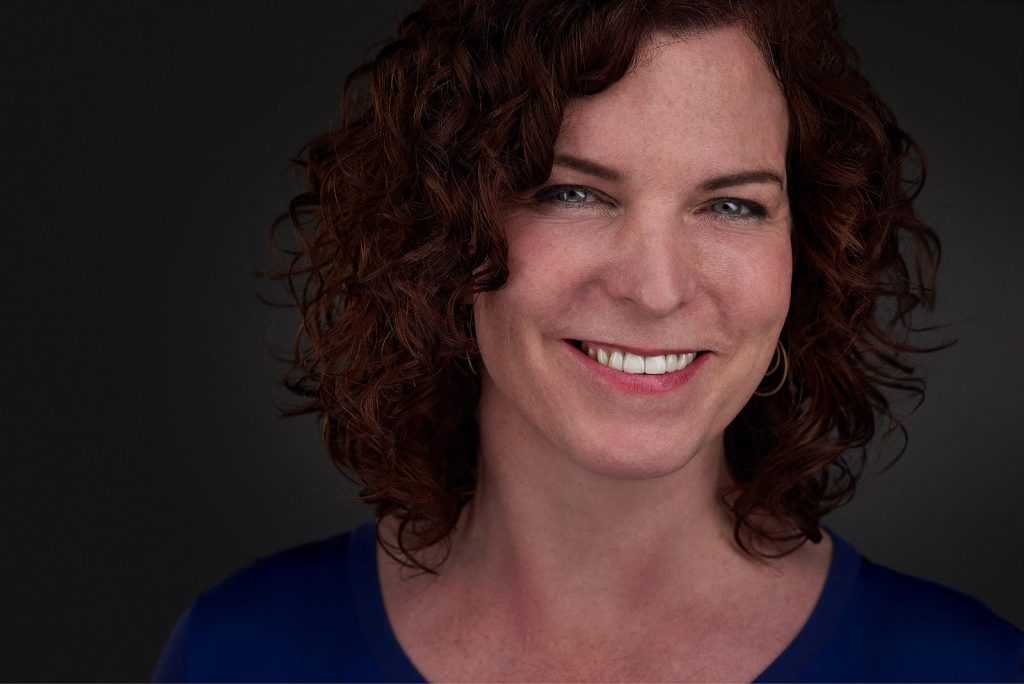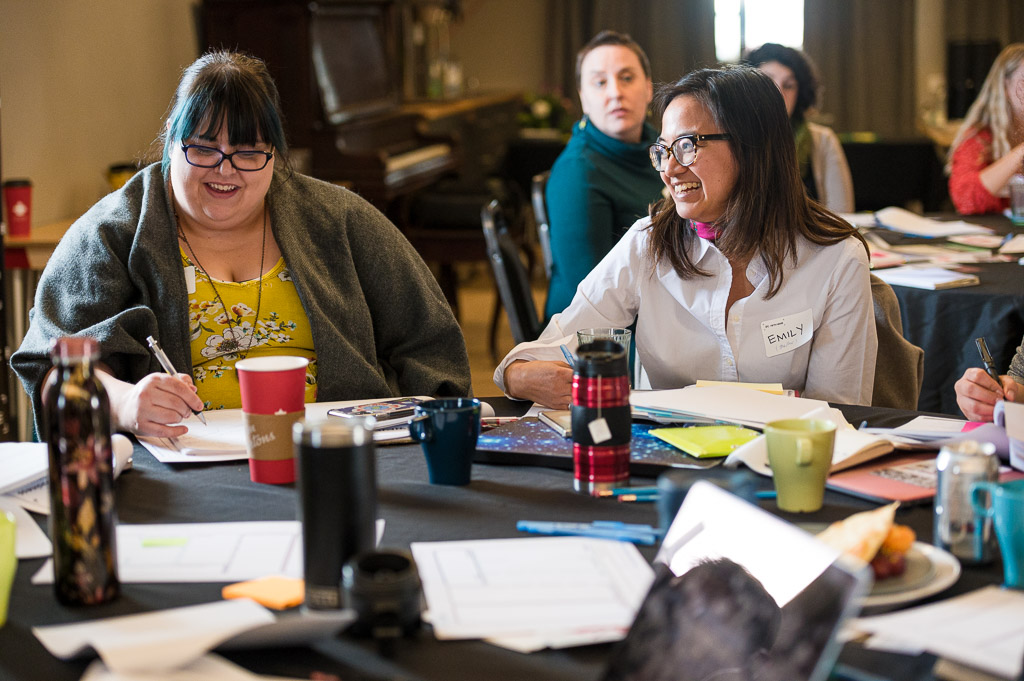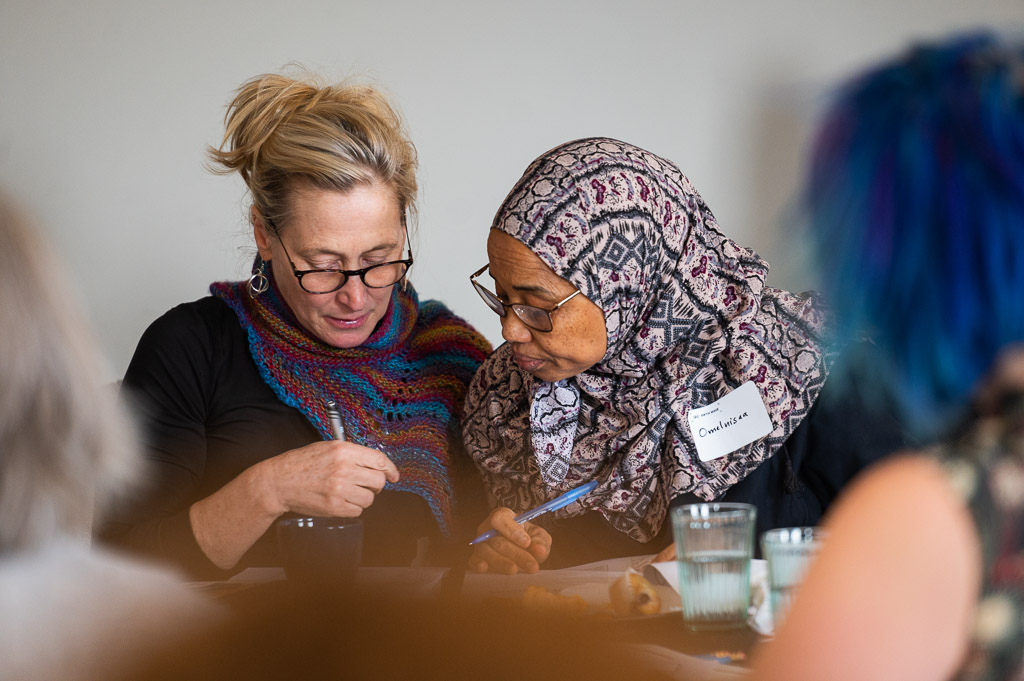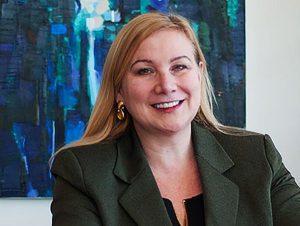
As Dee Brooks (she/her) prepared to launch a consulting business, she was understandably excited. She had worked more than a year to develop a market strategy for her company, Accelerated By Design. Aimed at corporate and not-for-profit clients, her firm would commercialize years of academic research into collaborative future-making through dialogue.
By February, 2020, Brooks had assembled a team of four, including herself, and expected to hire more staff. She had rented a space in Toronto’s downtown core, designing it as an immersive digital media experience for clients. She had sold tickets to a launch event. Revenue was trickling in. Future-making looked bright.
Then, the pandemic ruined everything.
“It was an utter catastrophe,” said Brooks. “We were in the middle of going to market with a new offering, something we thought was super innovative. That strategy was destroyed, the market changed, and we lost access to child care for six months.”
Brooks let her team go and refunded the ticket buyers. As she watched her big dream drip away, she grieved. “It was indescribably difficult. For me, this was my baby. It was the culmination of years of effort.
“Not all that work was lost, but a large portion of it was,” she said in a recent Zoom interview from her home office.
Brooks planned to offer a blended in-person and digital collaboration experience for her clients. But now, she has switched gears to go fully digital — which she had anticipated doing — but the pandemic fast-forwarded everything.
Digital-only delivery is a different ball game. Accelerated By Design will no longer be differentiated by its in-person experience. But the switch also means the can serve a global audience, rather than a regional one.
Brook’s story is emblematic. A recent study — The Pandemic Effect: Exploring COVID-19’s Impact on Women/Womxn-led Digital Media Businesses in Ontario — chronicles the challenges Brooks and her contemporaries face through disruption and recovery.
The Pandemic Effect
The research collective, Canadian Film Centre’s Media Lab (CFC Media Lab), OCAD University and Nordicity, funded by Ontario Creates Business Improvement Program, surveyed 28 women/womxn-led digital businesses in Ontario over five months in 2020. They gathered quantitative data through a survey and qualitative insights through a series of interactive workshops. The study report was released today.
The Pandemic Effect drew participants primarily (though not exclusively) from existing networks established by the CFC Media Lab’s Fifth Wave Initiative, Canada’s first and only feminist accelerator program. These businesses value purpose as much as they do profit, according to Nataly De Monte (she/her), managing director of Fifth Wave.
“Women in this space had a feminist perspective at the start,” said De Monte. “They’re already thinking about business in a regenerative sense, rather than an extractive one. And we wanted to know how feminist business practices could be applied to mitigate the effects of the pandemic.”

“That larger adaptation is the growing pain,” for digital media, De Monte explained. “It is not that they have to learn technology and become tech savvy. These businesses are already there. It is about how they adapt to the new and changing ways of the current context.”
The Hits and the Misses
One might assume digital media companies would be well positioned to respond to an increasingly tech-focused economy. In fact, the survey showed that only 21 per cent had seen sales or personnel grow during the first six months of pandemic. About 50 per cent reported being fine for now. Another 18 per cent said they would survive but may have to lay off people, and 11 percent indicated they were in dire straits and may go bankrupt.
The pandemic also affected productivity—about 21 per cent reported they were more productive than usual during shutdowns, 61 per cent were operating at a slower pace and seven per cent had stopped working entirely.
The survey and workshops used a strategic foresight model to examine the trends and drivers behind deep social change, asking respondents to evaluate the issues affecting them both now as well as three years into the future.
Increased stress and focus on mental health was the top concern among respondents, both now and in the future.
That is no surprise to Brooks, who said her mental-health challenges are far from over. As a new business, Accelerated By Design is not eligible for most government support programs, which are based on past revenue. She is still hoping to be eligible for rent subsidies.
Having her younger child back in daycare since September has freed up some hours for Brooks, who is working from home alongside her partner. But now she is a team of one at her company, strategizing her business recovery in isolation. Having paying clients is still in the future.
Little wonder that burnout emerged as a key theme in workshops. Suzanne Stein (she/her), director of OCAD’s Super Ordinary Lab, which helped execute the online events, said that participants “moved into an ideological realm” when discussing stress.
“We were starting to see participants questioning how the economy works. They were starting to say: ‘Wait. Why are we working in an industrial revolution model, which is distractive and harmful?’”
The Feminist Future
That feminist questioning can prove tactical. The study report describes specific strategies that digital media companies expect to use in the coming years. Among the ideas:
- valuing emotional labour
- developing healthy remote work cultures
- using virtual reality to host events
- being more flexible about where and when to work
- encouraging local economies
- baking intrapreneurship into business practices
- creating more and different partnership models
The conversation among digital entrepreneurs kept coming back to partnerships, community and collaboration, said Stein. Companies that act like they are part of an ecosystem will survive the coming years. Entities that were once competitors see themselves as potential partners.



Fifth Wave workshop for women in digital media on the feminist business model canvas, March, 2020.
Stein pointed out that it is hard for individual companies “to mobilize that kind of impact on their own. The next wave of innovation is not going to be about any individual or company, it is going to be about collaboration.”
Heeding that advice will help companies cope with future disruptions, Brooks suggested. “Maybe the pandemic is the first of a series of shocks… One thing that concerns me is that people are thinking: What are we going to do about the next pandemic? But climate change will present the next problem.”
The Pandemic Effect survey is repeatable, said Julie Whelan (she/her), associate director of Nordicity, a consultancy that designed and analyzed the survey. It could be used to gather information about other disruptions in other sectors and regions. It also includes a set of take-home worksheets participants can use as a thinking tool for planning for future disruptions.
“At the start of the pandemic, we were thinking the shocks or impacts of COVID would be intense but temporary,” said Whelan. “But, of course, what we have seen is that the experience is ongoing. So, there’s a chance to rethink how we operate and how we support businesses, maybe using some of the strategies identified (in the report) to build resilience for future shocks, which are undoubtedly around the corner.”
Despite that uncertainty, Brooks said she is optimistic about the future. While diversity and inclusion have always been a foundational concern for her and her team, she is finding that potential clients are now more interested in that conversation.
“We have this tendency to think that we can separate things out. But you have got to talk about it all at once. As horrible as it is, it is unclear that George Floyd would have been the catalyst that he was if it were not for the pandemic. And it pressured the pandemic. So, I am not so sure we can treat them separately. It is all one complex, interconnected mess.”
An intersectional feminist approach takes into account cultural complexity, which makes it a useful framework for pandemic recovery planning in any sector. But operational changes cannot be stopgap measures, Stein emphasized.
“In some ways with the survey, we were left with a bit of a cliffhanger. The implications of the pandemic are still running forward. What is important now is to keep moving,” she said. “We have to keep the momentum of some of the thinking. We have to keep the dedication to working together.”
Publishers Note: Fifth Wave Labs is Canada’s first feminist accelerator program for womxn in digital media. It is a year-round program offered by CFC Media Lab and its partners to support the growth and development of women entrepreneurs in the digital media sector in southern Ontario. All enterprise founders in the Fifth Wave community are selected for both their potential and commitment toward weaving intersectional feminist ideals of equity and social justice into sustainable and scalable business growth strategies. Fifth Wave Initiative is committed to 30% participation by members of underrepresented groups. The Fifth Wave is a LiisBeth Media partner and ally. Interested? Apply here.
Related Reading

She-lutions for a stalled economy
How Can Women Entrepreneurs Survive the Covid She-cession? A major report offers ideas

Growing Through a Pandemic
An urban gardening company finds strength in its coop roots to meet big challenges

Having A Baby in Pandemic Times
This May’s Feminists in Residence are fighting to support birthers’ rights through COVID-19. Luckily, they had the foresight to shift their business online years earlier.

As Dee Brooks (she/her) prepared to launch a consulting business, she was understandably excited. She had worked more than a year to develop a market strategy for her company, Accelerated By Design. Aimed at corporate and not-for-profit clients, her firm would commercialize years of academic research into collaborative future-making through dialogue.
By February, 2020, Brooks had assembled a team of four, including herself, and expected to hire more staff. She had rented a space in Toronto’s downtown core, designing it as an immersive digital media experience for clients. She had sold tickets to a launch event. Revenue was trickling in. Future-making looked bright.
Then, the pandemic ruined everything.
“It was an utter catastrophe,” said Brooks. “We were in the middle of going to market with a new offering, something we thought was super innovative. That strategy was destroyed, the market changed, and we lost access to child care for six months.”
Brooks let her team go and refunded the ticket buyers. As she watched her big dream drip away, she grieved. “It was indescribably difficult. For me, this was my baby. It was the culmination of years of effort.
“Not all that work was lost, but a large portion of it was,” she said in a recent Zoom interview from her home office.
Brooks planned to offer a blended in-person and digital collaboration experience for her clients. But now, she has switched gears to go fully digital — which she had anticipated doing — but the pandemic fast-forwarded everything.
Digital-only delivery is a different ball game. Accelerated By Design will no longer be differentiated by its in-person experience. But the switch also means the can serve a global audience, rather than a regional one.
Brook’s story is emblematic. A recent study — The Pandemic Effect: Exploring COVID-19’s Impact on Women/Womxn-led Digital Media Businesses in Ontario — chronicles the challenges Brooks and her contemporaries face through disruption and recovery.
The Pandemic Effect
The research collective, Canadian Film Centre’s Media Lab (CFC Media Lab), OCAD University and Nordicity, funded by Ontario Creates Business Improvement Program, surveyed 28 women/womxn-led digital businesses in Ontario over five months in 2020. They gathered quantitative data through a survey and qualitative insights through a series of interactive workshops. The study report was released today.
The Pandemic Effect drew participants primarily (though not exclusively) from existing networks established by the CFC Media Lab’s Fifth Wave Initiative, Canada’s first and only feminist accelerator program. These businesses value purpose as much as they do profit, according to Nataly De Monte (she/her), managing director of Fifth Wave.
“Women in this space had a feminist perspective at the start,” said De Monte. “They’re already thinking about business in a regenerative sense, rather than an extractive one. And we wanted to know how feminist business practices could be applied to mitigate the effects of the pandemic.”

“That larger adaptation is the growing pain,” for digital media, De Monte explained. “It is not that they have to learn technology and become tech savvy. These businesses are already there. It is about how they adapt to the new and changing ways of the current context.”
The Hits and the Misses
One might assume digital media companies would be well positioned to respond to an increasingly tech-focused economy. In fact, the survey showed that only 21 per cent had seen sales or personnel grow during the first six months of pandemic. About 50 per cent reported being fine for now. Another 18 per cent said they would survive but may have to lay off people, and 11 percent indicated they were in dire straits and may go bankrupt.
The pandemic also affected productivity—about 21 per cent reported they were more productive than usual during shutdowns, 61 per cent were operating at a slower pace and seven per cent had stopped working entirely.
The survey and workshops used a strategic foresight model to examine the trends and drivers behind deep social change, asking respondents to evaluate the issues affecting them both now as well as three years into the future.
Increased stress and focus on mental health was the top concern among respondents, both now and in the future.
That is no surprise to Brooks, who said her mental-health challenges are far from over. As a new business, Accelerated By Design is not eligible for most government support programs, which are based on past revenue. She is still hoping to be eligible for rent subsidies.
Having her younger child back in daycare since September has freed up some hours for Brooks, who is working from home alongside her partner. But now she is a team of one at her company, strategizing her business recovery in isolation. Having paying clients is still in the future.
Little wonder that burnout emerged as a key theme in workshops. Suzanne Stein (she/her), director of OCAD’s Super Ordinary Lab, which helped execute the online events, said that participants “moved into an ideological realm” when discussing stress.
“We were starting to see participants questioning how the economy works. They were starting to say: ‘Wait. Why are we working in an industrial revolution model, which is distractive and harmful?’”
The Feminist Future
That feminist questioning can prove tactical. The study report describes specific strategies that digital media companies expect to use in the coming years. Among the ideas:
- valuing emotional labour
- developing healthy remote work cultures
- using virtual reality to host events
- being more flexible about where and when to work
- encouraging local economies
- baking intrapreneurship into business practices
- creating more and different partnership models
The conversation among digital entrepreneurs kept coming back to partnerships, community and collaboration, said Stein. Companies that act like they are part of an ecosystem will survive the coming years. Entities that were once competitors see themselves as potential partners.



Fifth Wave workshop for women in digital media on the feminist business model canvas, March, 2020.
Stein pointed out that it is hard for individual companies “to mobilize that kind of impact on their own. The next wave of innovation is not going to be about any individual or company, it is going to be about collaboration.”
Heeding that advice will help companies cope with future disruptions, Brooks suggested. “Maybe the pandemic is the first of a series of shocks… One thing that concerns me is that people are thinking: What are we going to do about the next pandemic? But climate change will present the next problem.”
The Pandemic Effect survey is repeatable, said Julie Whelan (she/her), associate director of Nordicity, a consultancy that designed and analyzed the survey. It could be used to gather information about other disruptions in other sectors and regions. It also includes a set of take-home worksheets participants can use as a thinking tool for planning for future disruptions.
“At the start of the pandemic, we were thinking the shocks or impacts of COVID would be intense but temporary,” said Whelan. “But, of course, what we have seen is that the experience is ongoing. So, there’s a chance to rethink how we operate and how we support businesses, maybe using some of the strategies identified (in the report) to build resilience for future shocks, which are undoubtedly around the corner.”
Despite that uncertainty, Brooks said she is optimistic about the future. While diversity and inclusion have always been a foundational concern for her and her team, she is finding that potential clients are now more interested in that conversation.
“We have this tendency to think that we can separate things out. But you have got to talk about it all at once. As horrible as it is, it is unclear that George Floyd would have been the catalyst that he was if it were not for the pandemic. And it pressured the pandemic. So, I am not so sure we can treat them separately. It is all one complex, interconnected mess.”
An intersectional feminist approach takes into account cultural complexity, which makes it a useful framework for pandemic recovery planning in any sector. But operational changes cannot be stopgap measures, Stein emphasized.
“In some ways with the survey, we were left with a bit of a cliffhanger. The implications of the pandemic are still running forward. What is important now is to keep moving,” she said. “We have to keep the momentum of some of the thinking. We have to keep the dedication to working together.”
Publishers Note: Fifth Wave Labs is Canada’s first feminist accelerator program for womxn in digital media. It is a year-round program offered by CFC Media Lab and its partners to support the growth and development of women entrepreneurs in the digital media sector in southern Ontario. All enterprise founders in the Fifth Wave community are selected for both their potential and commitment toward weaving intersectional feminist ideals of equity and social justice into sustainable and scalable business growth strategies. Fifth Wave Initiative is committed to 30% participation by members of underrepresented groups. The Fifth Wave is a LiisBeth Media partner and ally. Interested? Apply here.
Related Reading

She-lutions for a stalled economy
How Can Women Entrepreneurs Survive the Covid She-cession? A major report offers ideas

Growing Through a Pandemic
An urban gardening company finds strength in its coop roots to meet big challenges

Having A Baby in Pandemic Times
This May’s Feminists in Residence are fighting to support birthers’ rights through COVID-19. Luckily, they had the foresight to shift their business online years earlier.

As Dee Brooks (she/her) prepared to launch a consulting business, she was understandably excited. She had worked more than a year to develop a market strategy for her company, Accelerated By Design. Aimed at corporate and not-for-profit clients, her firm would commercialize years of academic research into collaborative future-making through dialogue.
By February, 2020, Brooks had assembled a team of four, including herself, and expected to hire more staff. She had rented a space in Toronto’s downtown core, designing it as an immersive digital media experience for clients. She had sold tickets to a launch event. Revenue was trickling in. Future-making looked bright.
Then, the pandemic ruined everything.
“It was an utter catastrophe,” said Brooks. “We were in the middle of going to market with a new offering, something we thought was super innovative. That strategy was destroyed, the market changed, and we lost access to child care for six months.”
Brooks let her team go and refunded the ticket buyers. As she watched her big dream drip away, she grieved. “It was indescribably difficult. For me, this was my baby. It was the culmination of years of effort.
“Not all that work was lost, but a large portion of it was,” she said in a recent Zoom interview from her home office.
Brooks planned to offer a blended in-person and digital collaboration experience for her clients. But now, she has switched gears to go fully digital — which she had anticipated doing — but the pandemic fast-forwarded everything.
Digital-only delivery is a different ball game. Accelerated By Design will no longer be differentiated by its in-person experience. But the switch also means the can serve a global audience, rather than a regional one.
Brook’s story is emblematic. A recent study — The Pandemic Effect: Exploring COVID-19’s Impact on Women/Womxn-led Digital Media Businesses in Ontario — chronicles the challenges Brooks and her contemporaries face through disruption and recovery.
The Pandemic Effect
The research collective, Canadian Film Centre’s Media Lab (CFC Media Lab), OCAD University and Nordicity, funded by Ontario Creates Business Improvement Program, surveyed 28 women/womxn-led digital businesses in Ontario over five months in 2020. They gathered quantitative data through a survey and qualitative insights through a series of interactive workshops. The study report was released today.
The Pandemic Effect drew participants primarily (though not exclusively) from existing networks established by the CFC Media Lab’s Fifth Wave Initiative, Canada’s first and only feminist accelerator program. These businesses value purpose as much as they do profit, according to Nataly De Monte (she/her), managing director of Fifth Wave.
“Women in this space had a feminist perspective at the start,” said De Monte. “They’re already thinking about business in a regenerative sense, rather than an extractive one. And we wanted to know how feminist business practices could be applied to mitigate the effects of the pandemic.”

“That larger adaptation is the growing pain,” for digital media, De Monte explained. “It is not that they have to learn technology and become tech savvy. These businesses are already there. It is about how they adapt to the new and changing ways of the current context.”
The Hits and the Misses
One might assume digital media companies would be well positioned to respond to an increasingly tech-focused economy. In fact, the survey showed that only 21 per cent had seen sales or personnel grow during the first six months of pandemic. About 50 per cent reported being fine for now. Another 18 per cent said they would survive but may have to lay off people, and 11 percent indicated they were in dire straits and may go bankrupt.
The pandemic also affected productivity—about 21 per cent reported they were more productive than usual during shutdowns, 61 per cent were operating at a slower pace and seven per cent had stopped working entirely.
The survey and workshops used a strategic foresight model to examine the trends and drivers behind deep social change, asking respondents to evaluate the issues affecting them both now as well as three years into the future.
Increased stress and focus on mental health was the top concern among respondents, both now and in the future.
That is no surprise to Brooks, who said her mental-health challenges are far from over. As a new business, Accelerated By Design is not eligible for most government support programs, which are based on past revenue. She is still hoping to be eligible for rent subsidies.
Having her younger child back in daycare since September has freed up some hours for Brooks, who is working from home alongside her partner. But now she is a team of one at her company, strategizing her business recovery in isolation. Having paying clients is still in the future.
Little wonder that burnout emerged as a key theme in workshops. Suzanne Stein (she/her), director of OCAD’s Super Ordinary Lab, which helped execute the online events, said that participants “moved into an ideological realm” when discussing stress.
“We were starting to see participants questioning how the economy works. They were starting to say: ‘Wait. Why are we working in an industrial revolution model, which is distractive and harmful?’”
The Feminist Future
That feminist questioning can prove tactical. The study report describes specific strategies that digital media companies expect to use in the coming years. Among the ideas:
- valuing emotional labour
- developing healthy remote work cultures
- using virtual reality to host events
- being more flexible about where and when to work
- encouraging local economies
- baking intrapreneurship into business practices
- creating more and different partnership models
The conversation among digital entrepreneurs kept coming back to partnerships, community and collaboration, said Stein. Companies that act like they are part of an ecosystem will survive the coming years. Entities that were once competitors see themselves as potential partners.



Fifth Wave workshop for women in digital media on the feminist business model canvas, March, 2020.
Stein pointed out that it is hard for individual companies “to mobilize that kind of impact on their own. The next wave of innovation is not going to be about any individual or company, it is going to be about collaboration.”
Heeding that advice will help companies cope with future disruptions, Brooks suggested. “Maybe the pandemic is the first of a series of shocks… One thing that concerns me is that people are thinking: What are we going to do about the next pandemic? But climate change will present the next problem.”
The Pandemic Effect survey is repeatable, said Julie Whelan (she/her), associate director of Nordicity, a consultancy that designed and analyzed the survey. It could be used to gather information about other disruptions in other sectors and regions. It also includes a set of take-home worksheets participants can use as a thinking tool for planning for future disruptions.
“At the start of the pandemic, we were thinking the shocks or impacts of COVID would be intense but temporary,” said Whelan. “But, of course, what we have seen is that the experience is ongoing. So, there’s a chance to rethink how we operate and how we support businesses, maybe using some of the strategies identified (in the report) to build resilience for future shocks, which are undoubtedly around the corner.”
Despite that uncertainty, Brooks said she is optimistic about the future. While diversity and inclusion have always been a foundational concern for her and her team, she is finding that potential clients are now more interested in that conversation.
“We have this tendency to think that we can separate things out. But you have got to talk about it all at once. As horrible as it is, it is unclear that George Floyd would have been the catalyst that he was if it were not for the pandemic. And it pressured the pandemic. So, I am not so sure we can treat them separately. It is all one complex, interconnected mess.”
An intersectional feminist approach takes into account cultural complexity, which makes it a useful framework for pandemic recovery planning in any sector. But operational changes cannot be stopgap measures, Stein emphasized.
“In some ways with the survey, we were left with a bit of a cliffhanger. The implications of the pandemic are still running forward. What is important now is to keep moving,” she said. “We have to keep the momentum of some of the thinking. We have to keep the dedication to working together.”
Publishers Note: Fifth Wave Labs is Canada’s first feminist accelerator program for womxn in digital media. It is a year-round program offered by CFC Media Lab and its partners to support the growth and development of women entrepreneurs in the digital media sector in southern Ontario. All enterprise founders in the Fifth Wave community are selected for both their potential and commitment toward weaving intersectional feminist ideals of equity and social justice into sustainable and scalable business growth strategies. Fifth Wave Initiative is committed to 30% participation by members of underrepresented groups. The Fifth Wave is a LiisBeth Media partner and ally. Interested? Apply here.
Related Reading

She-lutions for a stalled economy
How Can Women Entrepreneurs Survive the Covid She-cession? A major report offers ideas

Growing Through a Pandemic
An urban gardening company finds strength in its coop roots to meet big challenges

Having A Baby in Pandemic Times
This May’s Feminists in Residence are fighting to support birthers’ rights through COVID-19. Luckily, they had the foresight to shift their business online years earlier.






